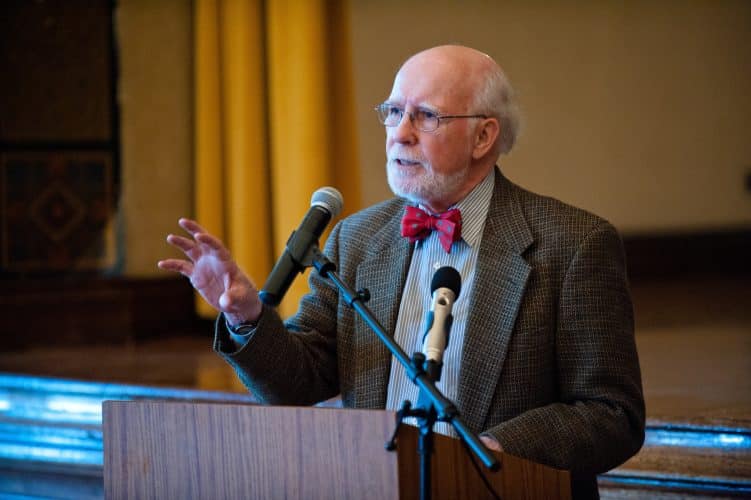Bernard McGinn spends most of his time with books. He rises at 7am, “not terribly early,” he says, works through the morning, and ends his scholarly research with a run to the library around 5pm. Before bed, he prefers reading books unrelated to his scholarship on mysticism. He enjoys reading novels or books on history. He has just finished reading a novel by the Irish writer Sebastian Barry and a historical account of railroad construction in the Florida Keys.
As the world’s leading expert on mysticism—and those extraordinary souls on the fringes of society who have shared through their writings what it means to surrender oneself to the Divine—it should come as no surprise that his most cherished possession is his library. He is proud to own 70 antique books published before 1800, all of them related to his scholarship in some way. The oldest book in his collection is the 3rd printing of Peter Lombard’s Sentences in Latin dating from before 1477.
To those students who would wish to emulate his trajectory to scholarly stardom, he offers this advice. “To be an expert at something, you need commitment, hard work, and a bit of luck.” He admits that he was lucky that his interest in mysticism became popular subject matter at the university during the course of his career. There are times when someone could be interested in something but no one else cares about it. Or fifteen years later they care.
“To be an expert at something, you need
commitment, hard work, and a bit of luck.”
But he emphasizes how important it is to work hard. “You have to have a fire in your belly,” he says. “There’s no substitute for hard work no matter how clever or brilliant you are.”
His partner in his scholarly pursuits is his wife of 46 years, Pat.
“Pat and I have tried to learn to live and work as a team,” he says. “Pat has her own career as a Psychotherapist and has also been very active in Counselor Professional organizations, both on the state and the national level. But she also has a background in theology and philosophy and so has a great interest in the things that interest me.”
The McGinns are indeed a power couple. One often sees them walking across campus together, and Pat sits near the front at almost all his lectures and conferences. They relish helping one other achieve intellectual excellence. “For many years, she has edited almost everything I write,” says McGinn. “We even did a book together back in 2003, Early Christian Mystics: The Divine Vision of the Spiritual Masters, and are currently working on another joint volume to be called Mystical Conversations.”
They are as united in their intellectual interests as they are in their faith. They start and end their day with a wonderful ritual—praying the Divine Office together.
McGinn has now been at the University of Chicago for almost fifty years. He is a legend, the kind of person serious students get starry-eyed about. He seems to belong to another era as he came to the U of C just after Vatican II, when the Divinity School was looking to recruit Catholic scholars to its faculty.
For McGinn, these years have been an adventure. He admires the remarkable genius of the faculty members he is surrounded by, and he has loved engaging with each year’s cadre of bright, engaging students.
Of Lumen Christi, McGinn says that Thomas Levergood “blames me for getting it started.” He clarifies by sharing that in the 1990s, when Fr. Willard Jabusch—the Chaplain of the Calvert House Catholic Chaplaincy at the U of C—talked about having a Catholic Studies department on campus, McGinn opposed the idea. “I thought it would be good to have a center that offered lectures and courses and tapped into a whole range of people, not just the faculty at Chicago.”
It was Thomas Levergood and Paul J. Griffiths—now Warren Professor of Catholic Theology at Duke Divinty School—who started the Institute in 1997, and did “all the hard work,” says McGinn.
Today, practically twenty years later, the Institute has achieved what McGinn never thought would be possible. Not only does it offer lectures and events on campus, but it also gives courses at Berkeley, in Boston, and New York City—and now even in Europe. “It is beyond what I envisioned,” he admits.
This spring, McGinn is thrilled to be presenting yet another lecture for Lumen Christi. The topic—“The Soul of Early Irish Monasticism”—is one especially dear to him. After all, he is three-quarters Irish, and one-quarter Scots. He and Pat travel to Ireland as often as they can, and for the lecture, he will be presenting a slide show of 80 photographs which he took himself as he traversed the country and visited its ancient centers of Irish monastic culture.
One way people show what they love is how much time they give to it. If that is true, then McGinn has two loves—his beloved wife Pat and other-worldly mystical types, especially those that hail from where his ancestors did, the Emerald Isle.
